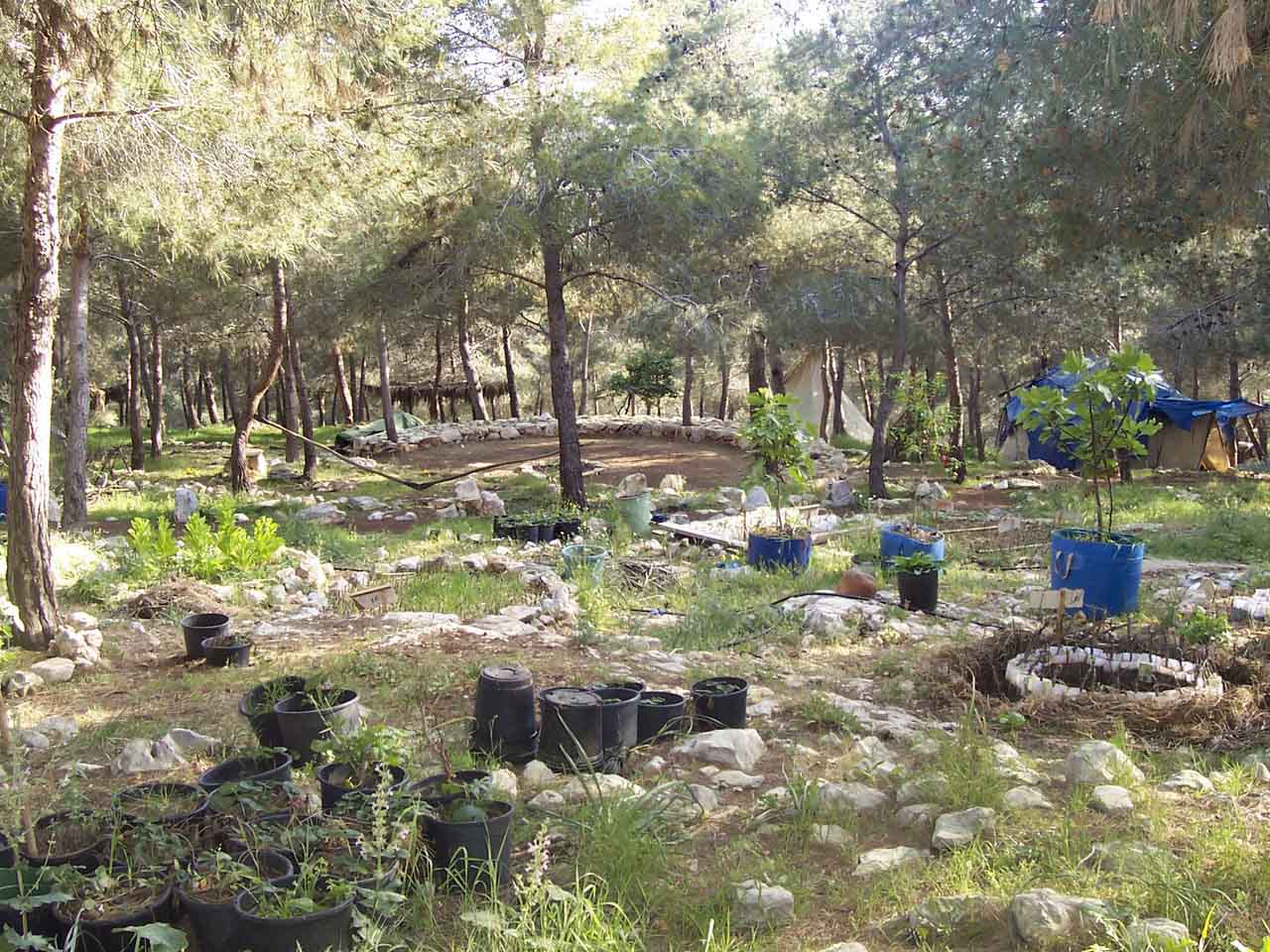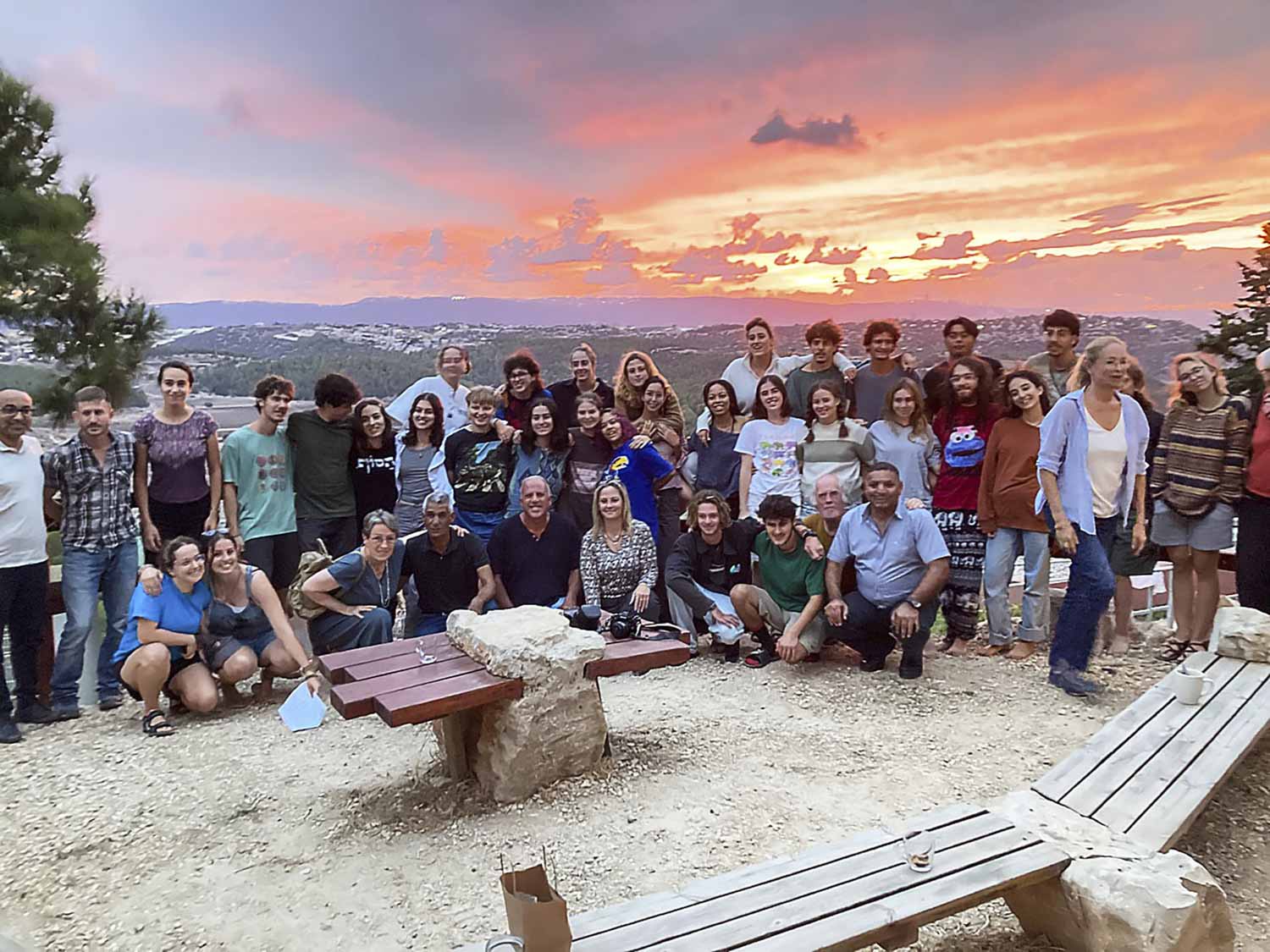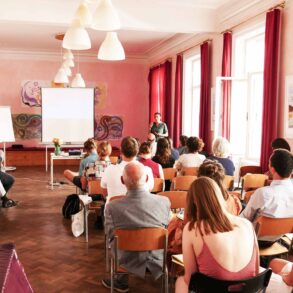For 25 years, Ilse Wellershoff-Schuur has been working with Arab and Jewish partners from Galilee to create a meeting place for all of the cultures in the region. Over the years, a place of living and learning for volunteers and seminarians, a forest theater stage, a garden, and an inter-religious place of worship have grown in the forest, on the edge of the anthroposophical village community of Harduf. The 25th anniversary celebration, held in Oldenburg, Germany, on October 13, was particularly meaningful in the shadow of violence and war.
Everything was completely different than expected and so different from back then, not just because something grew in the 25 years of “Gateway to the World,” the non-profit association Tor zur Welt—Sha’ar laOlam—Bab l’alAlem. And not just because we’ve grown older or because the places have physically changed. A place is growing in Galilee, like the one we envisioned in our imaginations back then, but it, too, has become completely different! And in Oldenburg, where we met because it was where the initiative originated, we met in completely different surroundings—not in a living room “church” like the small youth circle back then, but in a bright church building, a newly created “cultural area.”
The anniversary meeting was different from what we had planned, mainly because, strangely, a new era had dawned at the same time, with a more devastating mood than we had ever experienced in 25 years of living with the conflict in the Middle East. The war was less than a week old when we came together. The shocking terrorist attack, the deep insecurity, the personal worries, and the losses affected all the participants from Israel. The question arose, “Can we still celebrate? And if so, how?”

There we were, gathered in northern Germany on Friday, October 13, true to the resolution we made over a year earlier. Miraculously, many people came. And even more memorably, despite the difficult situation, around a quarter of the almost 50 participants came from Galilee. These included the co-founders Yaakov and Miriam Arnan and Amin Sawa’ed with his wife Fatma, who, along with myself, were the young guides back then and are now in their mid-forties. In addition, there was a selection of actors from the Hamila Theater, which is run by the same association as the Sha‘ar laAdam–Bab l’ilInsan Meeting Place, plus former youth camp participants from various phases of the movement who have carried on the work over the years, the Executive Board of the association, active members, sponsors, supporters, ten former volunteers from recent years from the Freunden der Erziehungskunst [Friends of Waldorf Education] and a Jewish volunteer sponsorship agency, and a few children and grandchildren. On average, there were more young people. Someone said, “We are a family, no, much more than a family. Sha‘ar laAdam–Bab l’ilInsan Meeting Place is a new culture of humanity’s collaborative spirit.”
The dramatic-lyrical performance of “Jerusalem Weaving Shadow and Light” was a gift that arose out of the invitation offered to the Hamila Theater to perform at the Goetheanum World Conference on Michaelmas, two weeks before our anniversary. The play became an interpretation of humanity’s current situation and a bit of self-therapy for the actors, who were caught off guard by the events in their home country after their performances in Basel, Freiburg, and Überlingen in Frankfurt on their tour following the Goetheanum performance. For most of the performers, there were immediate connections to specific people, to victims they knew, worries about relatives and friends, friends whom no one knew what had happened to them because everything was unclear and, in some cases, still is today. Who is still alive from those we no longer hear from? There were worries about people back home, relatives who stayed home, and the return journey at the end of the tour—these concerns were always present, overshadowing a carefree celebration and taking feelings and thoughts into deep contemplation. Is it even possible to perform theater like this? Or, as one of the participants said, “You must perform theater if you don’t want to go crazy!” The performance included Yeats’ piece on The Resurrection, a scene from Solovyov’s Tale of the Antichrist, something from Christopher Fry’s A Sleep of Prisoners: “The human heart can go the lengths of God. . . ,” and was framed by Hebrew poems by Iftach Ben Aharon. All told, it was a modern mystery play with brilliant music, especially the first poem about Jerusalem sung in Arabic.
Shortly beforehand, a week of peace exercises had taken place at the Meeting Place in the Holy Land for Michaelmas, the Feast of Tabernacles, and also the birthday of the Prophet Mohammed, with local participants and those who had traveled from Germany. “Mi-ChaEl: Who is like God?” The theme was “Being Human—Becoming Human,” the question of what people can do to become true human beings, questions about resilience, the [six] subsidiary exercises [of Rudolf Steiner], and the prayer from the sacrament of confession of the Christian Community. “Thank God our time is now, when wrong comes up to meet us everywhere . . . .” [Fry’s A Sleep of Prisoners] Today, everything is always different; how do we hold up?

Some of the people at the anniversary weekend had only arrived or returned from Israel a few days before the terrorist attack. However, some fellow travelers had stayed in the country to do volunteer service or go on vacation. They were now affected by the fact that flights had been canceled and their journey home was in doubt. In the background, there was a constant stream of requests for help from their relatives, while reciprocally, the Israelis were also looking for new ways home. Via Frankfurt, Amsterdam, Berlin? Or perhaps to England first? Or via Amman? The relatives who had stayed home protested; two Israeli tourists had just been murdered in Egypt as a result of the events. Offerings poured in. You would be welcome everywhere if you wanted to stay longer. But everyone preferred to be home in this situation. There were numerous offers of help for the Germans in Israel, but they also wanted to go home or to another country to continue their volunteer service.
Over the years, something has grown that connects us, and over the course of the weekend, this connection also came to life between people who had not known each other before because we were not all in Sha‘ar laAdam–Bab l’ilInsan at the same time. The name of the association is so true—the German, “Tor zur Welt” [Gateway to the World]—because we are becoming more and more citizens of the world, looking beyond what captivates us on a small scale, in our group affiliations. But so too is the Arabic-Hebrew name, which means “Gateway to the Human Being,” to being human, to becoming human. The human being is the key. As someone said in the vigil on Saturday morning, “We must never forget that in every human being, even the cruelest terrorist or the foot soldier carrying out orders, even the general and the politician, there is a human being and, thereby, a spark of God’s image that carries the individual.” In this respect, we are more related than blood relatives, all children of a creative idea, even if we repress, forget, or deny it.
Other remarkable things were spoken in the vigil. What did the encounter with this special place mean to an individual? The report by an Islamic scholar on the changes in the political situation over the last 25 years was impressive, as was the very personal statement by one of our members from the very beginning, who follows the current situation as a diplomat and member of the crisis team at the Federal Foreign Office. Many others talked about how their professional and private lives have been influenced by the idea that we all bear responsibility, that we can do something, that our commitment is never irrelevant, whether as an artist, teacher, or activist . . . precisely because everything is different in our times. “Affairs are now soul-size. The enterprise is exploration into God.” (Christopher Fry)
More Tor zur Welt … e.V.
Translation Joshua Kelberman
Title image With the young volunteers and representatives of the civil society during the 2023 peace exercise week. Photo credit: Ilse Wellershoff-Schuur













